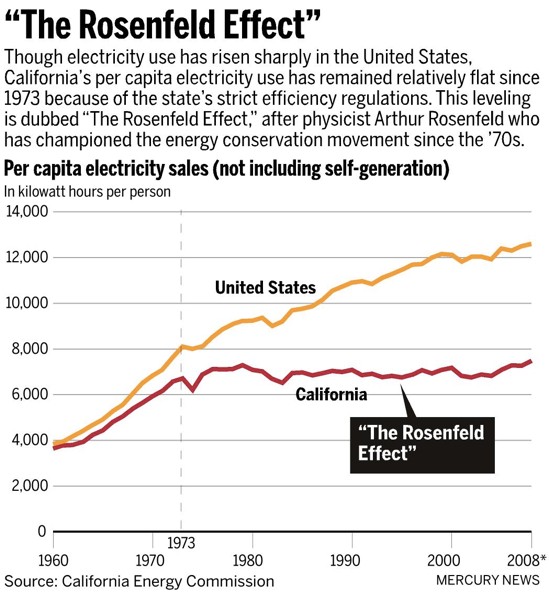During the 1970s, as the oil crisis was just beginning to show the vulnerabilities in the world energy supply, Arthur H. Rosenfeld was teaching physics at UC Berkeley, and was daily thinking about how best to weather the storm. He began by doing what seemed the most practical: turning off the lights at the lab when they were not being used. He then attacked the problem with that very same practicality and precision that would mark his long career as scientist and policy maker.Rosenfeld turned the usual solution on its head: instead of burning more oil or transitioning to more coal-fired plants, as Californians were then considering, he saw that they really ought to be using energy in a more efficient manner. In a phrase that encapsulates his career as scientist and policy-maker, “The cheapest energy is what you don’t use.”

Technologies developed under his leadership at the Lawrence Berkeley National Laboratory and policies created during his charge as Energy Commissioner kept energy usage in California flat even while the national average continued to grow. Rosenfeld was so instrumental in this transition to smart energy usage that he was awarded with the Lifetime Achievement Award by then-Governor Arnold Schwarzenegger in 2010, which specifically pointed out his expertise in the field of electricity. Then, in 2016, he was announced as the recipient of the 2016 Tang Prize in Sustainable Development, which cited his “three decades of scientific breakthroughs, technology innovations and policy advancements” that led to large-scale reductions in energy use and greenhouse gas emissions.
In both technology and policy, Rosenfeld has left a lasting legacy in energy. The Center for Building Science, headed by Rosenfeld, developed the high-frequency electronic ballasts which made compact florescent light bulbs possible. They also developed windows which are especially coated to allow visible light to pass while blocking thermal radiation. DOE-1 and DOE-2, computer programs for building energy analysis and design, were developed under Rosenfeld’s leadership; Energy Plus, the renamed and expanded version of DOE-2, has since become standard in many places around the world.
But, he did not limit his concern to just the technical aspects of energy savings. In the 90s and early 21st century, Rosenfeld entered the political milieu first as Senior Advisor of the US Department of Energy’s Assistant Secretary for Energy Efficiency and Renewable Energy, and later as Commissioner of California’s Energy Commission. It was during these two crucial terms in office that he advanced policies that brought attention to so-called “energy vampires,” referring to appliances such as TVs that drew energy even when in stand-by mode.
The impact of these technology and policy innovations have been profound:
A 2001 US National Academy of Sciences study showed that Prof. Rosenfeld’s initiatives and innovations have saved $30 billion. It also estimated that by 2030 such energy standards will have saved a total of $1.8 trillion and 7 billion tons of CO2 emissions—equal to the annual emissions of 1.5 billion cars.
His focus on energy savings did not wane with his retirement. Along with his fellow researchers, he proposed that by retrofitting roofs on every building in the world with reflective white coating, the resultant reduction in greenhouse gas would be equal to eliminating then emissions of all the world’s cars for 11 years.
With a long and illustrious career behind him, Rosenfeld celebrated his 90th birthday in 2016 and took that opportunity to announce to friends and family his winning the Tang Prize. While he will not be traveling in person to Taiwan to receive the medal, diploma, and prize money, Rosenfeld will be pre-taping an acceptance speech and having one of his past graduate students—Ashok Gadgil, an expert in energy and water—represent him at the ceremony, lectures, and forums which will be held during Tang Prize Week, September 22-28.
Those interested may find more information and register for the lectures and forums at the following links:
Laureate Lectures: http://topic.cw.com.tw/event/2016tangprize/
Masters’ Forum: http://topic.cw.com.tw/event/2016tangprize_master/